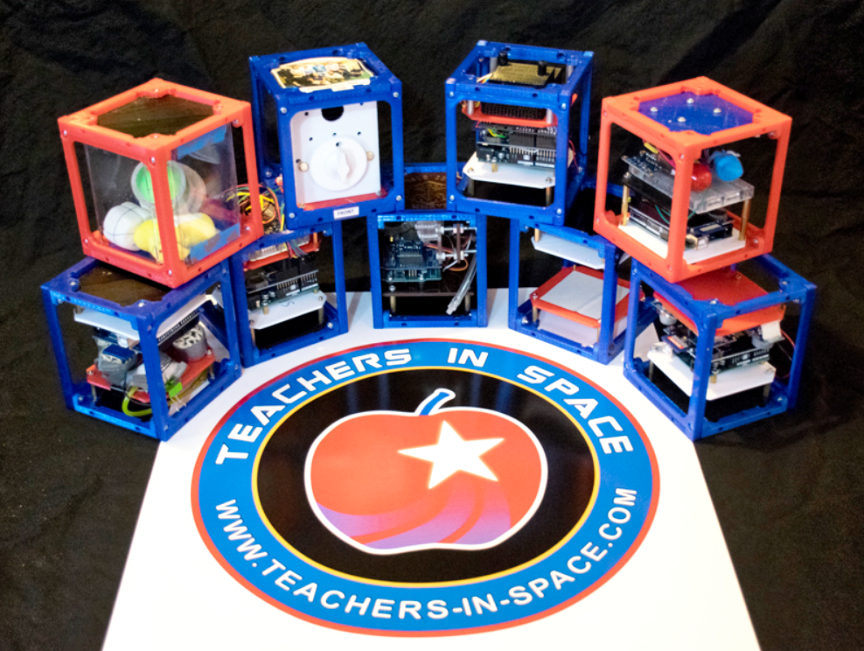
Villanova University College of Engineering is collaborating with Teachers in Space, Inc., a non-profit organization that developed the “Serenity” educational cubesat satellite, to launch the first, private, blockchain satellite to validate the technology for inter-satellite transactions. A flight has also been secured on Firefly Aerospace’s Alpha launch vehicle, which will lift off from the Vandenberg Air Force Base in California.
This project is led by Hasshi Sudler, an adjunct professor Villanova’s College of Engineering and CEO of the Internet Think Tank, and he also ran the school’s hackathon to address poverty through blockchain technology last year.

This experiment will prove that blockchain can allow two satellites to reliably complete data transactions without communicating with a ground station to supervise these inter-satellite exchanges. The satellite will remain in LEO for approximately 30 days and controlled blockchain experiments will take place during the first 15 days the satellite is on-orbit.
Professor Sudler noted that the blockchain provides a trusted and immutable means of tracking these exchanges between satellites that may belong to different companies or even different countries.
Villanova researchers will grant 10 non-researchers with experience using blockchains with access to the onboard blockchain for the remainder of the flight for measuring transaction performance under heavier traffic loads. While the satellite is on-orbit, the latter half of the test period will be dedicated to open access from Villanova to perform test transactions between the ground station and the satellite.
The transaction data will be test files (text and images of various file sizes) that will create various loads on the blockchain. These transactions will also be allowed to interact with Ethereum smart contracts (programs that can automatically trigger a new transaction when a specific condition is met). All transactions are permanently recorded on the blockchain ledger.
The satellite will remain in low Earth orbit for approximately 30 days, and controlled blockchain experiments will take place for the first 15 days.
Villanova researchers will grant select non-researchers access to the onboard blockchain for the remainder of the flight for measuring transaction performance under heavier traffic loads. These individuals will be limiting a group of up to 10 individuals who have experience using blockchains.
While the satellite is in orbit, the latter half of the test period will be dedicated to open access from Villanova to perform test transactions between the ground station and the satellite. The transaction data will be test files (text and images of various file sizes) that will create various loads on the blockchain. These transactions will also be allowed to interact with Ethereum smart contracts (programs that can automatically trigger a new transaction when a specific condition is met). All transactions are permanently recorded on the blockchain ledger.
Sudler and Gomez will measure the impact of high traffic on the blockchain network as well as any impacts on the transactions themselves as the satellite enters and leaves the Earth’s horizon to the ground station. “When we consider a full constellation of blockchain satellites transacting with one another and with a ground station, we need to monitor any performance impact on the blockchain as the satellites are traveling rapidly in different orbits. The momentary visibility between satellites as well as with a ground station may introduce challenges to fully synchronize and secure new transactions on the blockchain in a timely manner.”
Sudler notes that the blockchain provides a trusted and immutable means of tracking these exchanges between satellites that may belong to different companies or even different countries. “Benefits of inter-satellite transactions include lowering the need for numerous ground stations to maintain constant communication with orbiting satellites. It also allows one satellite to leverage unique data held by other satellites to complete its mission. And by leveraging data from satellites already in orbit, society can minimize excessive satellite deployments and reduce space debris, one of the highest risks to existing satellites,” says Sudler.
The experiment leverages an Ethereum Private Network using Proof of Authority as its consensus protocol. Proof of Authority is considered more robust than other consensus protocols because it uses a validator’s identity rather than assets held to ensure validators are working in the best interest of securing the blockchain. It also avoids using large amounts of energy associated with traditional blockchains.
The Ethereum Private blockchain is hosted on a Raspberry Pi (single board computer) and mounted in the ‘Serenity’ satellite, a 3U CubeSat weighing 2.6 kilograms.
The November 20 launch will be the first of several planned space flights in which future academic experiments aim to test several cubesats in LEO transacting on a private blockchain.

To launch the blockchain into space, Villanova University is collaborating with Teachers in Space, Inc., a non-profit organization that developed the “Serenity” educational CubeSat satellite and secured a flight on Firefly Aerospace’s Alpha launch vehicle. The two-stage rocket is tentatively scheduled to lift off from the Vandenberg AFB in California in November.
Teachers in Space, headed by Elizabeth Kennick, President, has previously guided academic institutions in developing and flying experiments suborbitally and at the International Space Station. This will be the first independent orbital satellite mission for Teachers in Space and a unique opportunity for Villanova University to conduct pioneering blockchain experiments on a satellite. Serenity will also carry a suite of data collection sensors, and will provide its data in response to requests by amateur radio operators.
Executive Comment

Satellite transactions over the blockchain will be a way to securely request, transfer and pay for data between satellites. “Similar to a postal delivery, the receiver signs for the package to confirm receipt. Blockchain transactions do the same but with the added security of making sure many people witness the fact that you signed for a package, received it, and paid for it. Because the group forms a consensus around this exchange, there is no need for a single trusted third party (TTP) to oversee the validity of the exchanges. The blockchain allows two satellites to reliably complete data transactions without communicating with a ground station to supervise these inter-satellite exchanges,” explained Sudler. “Recent growth and interest in satellite deployments have raised the need to limit excessive deployments by leveraging existing satellites in space, and one means of accomplishing this is with inter-satellite transactions. The challenge of transacting between satellites securely, however, centers around the constant motion of satellites themselves, where brief network connections between satellites can prevent replicating data across the blockchain and, thus, potentially delay timely verification of transactions.”

